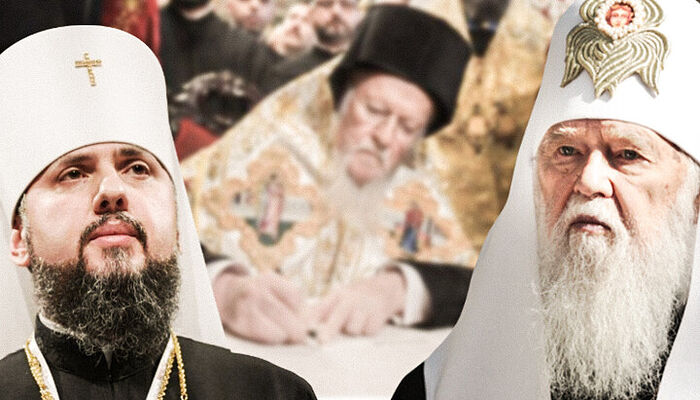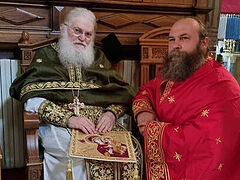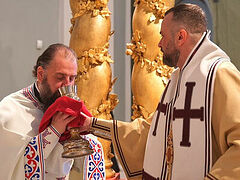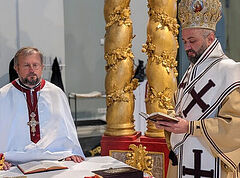Malaga, Spain, October 26, 2023
The canonical Ukrainian Orthodox Church has a much more active and healthier spiritual life than does the so-called “Orthodox Church of Ukraine,” which is frivolous and deluded and which was created by the misguided interference of Patriarch Bartholomew, believes Fr. Taras Petrunyak.
The Ukrainian outlet Dialog.tut published an interview with Fr. Taras this week in which he offers an interesting perspective because he has experience in both schismatic and canonical jurisdictions, both within and outside of Ukraine—experience that allows him to see, despite being a priest of the Patriarchate of Constantinople, that the UOC under His Beatitude Metropolitan Onuphry of Kiev is the true Church of Ukraine, offering a true Christian example as opposed to the schismatics of the OCU.
Fr. Taras lives with his wife and children in Spain, where he serves in the Church of the Holy Cross in Malaga. He was initially a priest in the schismatic “Kiev Patriarchate” (one of the two groups that merged into the “Orthodox Church of Ukraine” in 2018), but has been a priest under Constantinople since 2004.
“Let’s be honest, we’re amazed by Father Tarasius’ frankness, as well as the freedom of expression that he allows himself in assessing the actions and decisions of his Patriarch, which seems absolutely impossible within many other jurisdictions,” the outlet writes.
When Fr. Taras realized he wanted to devote his life to the priesthood, he first enrolled at the “Kiev Patriarchate’s” (KP) seminary in Ivano-Frankivsk, because he himself was from western Ukraine and because society perceived the canonical UOC as being absolutely pro-Russian, though when he later studied in Kiev he realized this was not the case, he told Dialog.tut.
It was when he moved abroad that he joined the Patriarchate of Constantinople. Later, he began to think about continuing his theological education, and he decided to go to the Kiev Theological Academy at the Kiev Caves Lavra, remembering all the wonderful things his mother had told him about the Lavra.
“And studying in Kiev gave us the opportunity to look at the Lavra from the inside, to live its life,” Fr. Taras recalls.
Leaving the schismatic KP helped him to see that the Church is more than just a club:
Within the Patriarchate of Constantinople, and later among the UOC, I saw that the Church is not a club of people gathered on national and religious grounds, but a supranational living organism in which, in fact, flows the Blood of Christ. And it’s incorrect to think with secular slogans in the bosom of the Church.
He began to understand the situation in Ukraine differently, realizing that he had to think of it from a Christian point of view, not a “Ukrainian” point of view:
Here I saw that the community is primarily not just a “place of Service.” In our western Ukraine, a priest is rather just an employee who has to come to church and do his work there. There’s the head of the community, there is, perhaps, the “church twenty,” who determine what a priest should do, how he should serve, and who to pray for.
That is, the priest often acts as a certain mercenary. In the conditions of Western Europe, a community is a family where everyone knows each other, where after the Liturgy they gather for tea, to talk—a common phenomenon.
Since then, I have begun to look at the Church differently, at Church processes, including those that are taking place in the Orthodox life of Ukraine. And I realized that it’s necessary to look at them from the point of view of not just a Ukrainian, but a Christian.
When Fr. Taras switched from the KP to Constantinople in 2004, he was told that his ordination was graceless and that he would have to be reordained. However, as Fr. Taras stresses, when Constantinople created the OCU in 2018, it accepted all the clerics of the KP and the schismatic “Ukrainian Autocephalous Orthodox Church” without reordaining them.
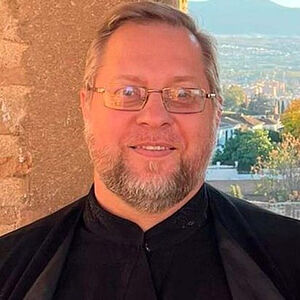 Fr. Taras. Photo: dialogtut.org Expounding on this contradiction, he said:
Fr. Taras. Photo: dialogtut.org Expounding on this contradiction, he said:
In 2004, I was a priest of the Kiev Patriarchate. However, when I asked to join the Patriarchate of Constantinople, I was told: “Your ordination is not filled with the grace of the Holy Spirit.” Therefore, I was accepted as a layman and ordained as a legitimate priest already in the bosom of the Church of Constantinople.
But in 2018, the same Patriarch accepted the clergy of the UOC-KP and UAOC as priests.
According to Apostolic canon 68 and canons 36 and 59 of the Council of Carthage, no one can be ordained a second time to the same degree. If a priest was lawfully ordained, and someone celebrates an ordination over him for the second time, then both the one who ordained and the one over whom the second Sacrament was celebrated are deprived of their dignity.
So the question is: At what point were the ordinations of the former Kiev Patriarchate filled with grace? If they were filled with the Holy Spirit from the very beginning, it turns out that I should be stripped of my dignity as a twice-ordained person. If the consecrations of representatives of the UOC-KP, as well as mine, were invalid, then why were they not accepted into the bosom of Constantinople as laymen?
And these canonical problems have far-reaching effects, Fr. Taras believes:
The quality of liturgical life also follows from the problem of canonicity of ordinations. I am not such a prayerful man myself—there are priests who pray more and much better than me—but there must be certain norms: fasts, attendance at Divine services, an appropriate attitude towards the priestly ministry. In the same Ivano-Frankivsk, fewer believers pray in the Cathedral of the OCU [schismatics] at the evening service than pray in the evening in the cathedrals of the [canonical] UOC.
What motivates people to come to the evening service? Understanding that this is a certain kind of preparation for the Liturgy. And in my native western Ukraine (where the OCU now prevails), people often go to church simply because “it’s necessary.” But Christians should go to church to find Christ there!
Among my neighbors, there were many who might go to church today to the Orthodox, and next Sunday to the Greek Catholics. That is, I saw among the flock of the then UOC-KP a certain frivolity in the approach to the Church. I see it now, already in the OCU. How seriously, for example, the UOC talks about the need for fasting, and how rarely such discussions are had in the OCU.
Personally, this encourages me to think about the authenticity of a particular Church. I don’t think now in the paradigm of who’s better or worse, but I use precisely the juxtaposition of real and fake.
A layman can be a Christian, but without appropriate canonical actions, he can’t be a real priest or monk. Therefore, I understand the doubts of the UOC faithful regarding the consecration of the OCU.
And although he is a priest of Constantinople, Fr. Taras believes his Patriarch was clearly in the wrong in the Ukrainian situation:
I believe that Patriarch Bartholomew’s actions on the Ukrainian issue were erroneous. The stated goals haven’t been achieved, the Ukrainian issue hasn’t been resolved, the schism hasn’t been healed, because in my opinion, people who aren’t clergy have entered the Church body. The pan-Orthodox crisis has deepened. And I think this is because the Patriarch made the decision alone, and didn’t appeal to the voice of the Church, although our Church is a conciliar one (as indicated in the Nicene Creed).
Fr. Taras also spoke about the tragedy of the persecution of the Church in Ukraine today:
I can't imagine the things that are happening in Ukraine today happening in Spain – that they would come to my church with buzz saws, insult me—to satisfy some of their personal needs. And the government also took part in this.
And, of course, this tragedy has a spiritual dimension, he notes:
Looking at the actions of the OCU in relation to the UOC, I understand that its representatives are in a state that the Holy Fathers call prelest. That is, they are in some kind of delusion, which, in turn, encourages them to do certain things. People in this state can’t give an objective assessment of their own actions…
It’s difficult for me to understand how a priest who cuts the locks on a church with a buzz saw today can stand in the same church tomorrow and tell the congregation about love.
When the Russian war in Ukraine started, Fr. Taras recalls, he told his parishioners: “Let’s pray for an end to the war, for peace in Ukraine, and let’s not criticize the Ukrainian president, at least until this whole story is over.”
He explains:
I thought that in the conditions of war, Ukrainian society would consolidate—on the religious, linguistic, political issue, that it would come together in a single strong fist. But, unfortunately, this didn’t happen. This isn’t the first time in history that Ukrainians have fought each other, so maybe it's time to rethink the past, not to repeat their own mistakes?
In conclusion, Fr. Taras believes the canonical UOC should be the consolidating factor in Ukrainian society:
The main factor of Orthodoxy is that it is a supranational religion. Ukrainians, Georgians, Greeks, and people of any other nationality can commune with each other over the same chalice in a single Orthodox parish. And Ukraine is multi-national, and this should be taken into account. The UOC has authority both in the West and in the East, both in the North and in the south of Ukraine. It could be a Church that unites the country, consolidates society.
Where was the UOC in the events of the winter of 2013-2014? On the demarcation line, where the monks of the Tithes Monastery stood, who tried to reconcile the parties to the conflict and prevent carnage. And this, in my opinion, is the most correct place.
Follow OrthoChristian on Twitter, Vkontakte, Telegram, WhatsApp, MeWe, and Gab!

